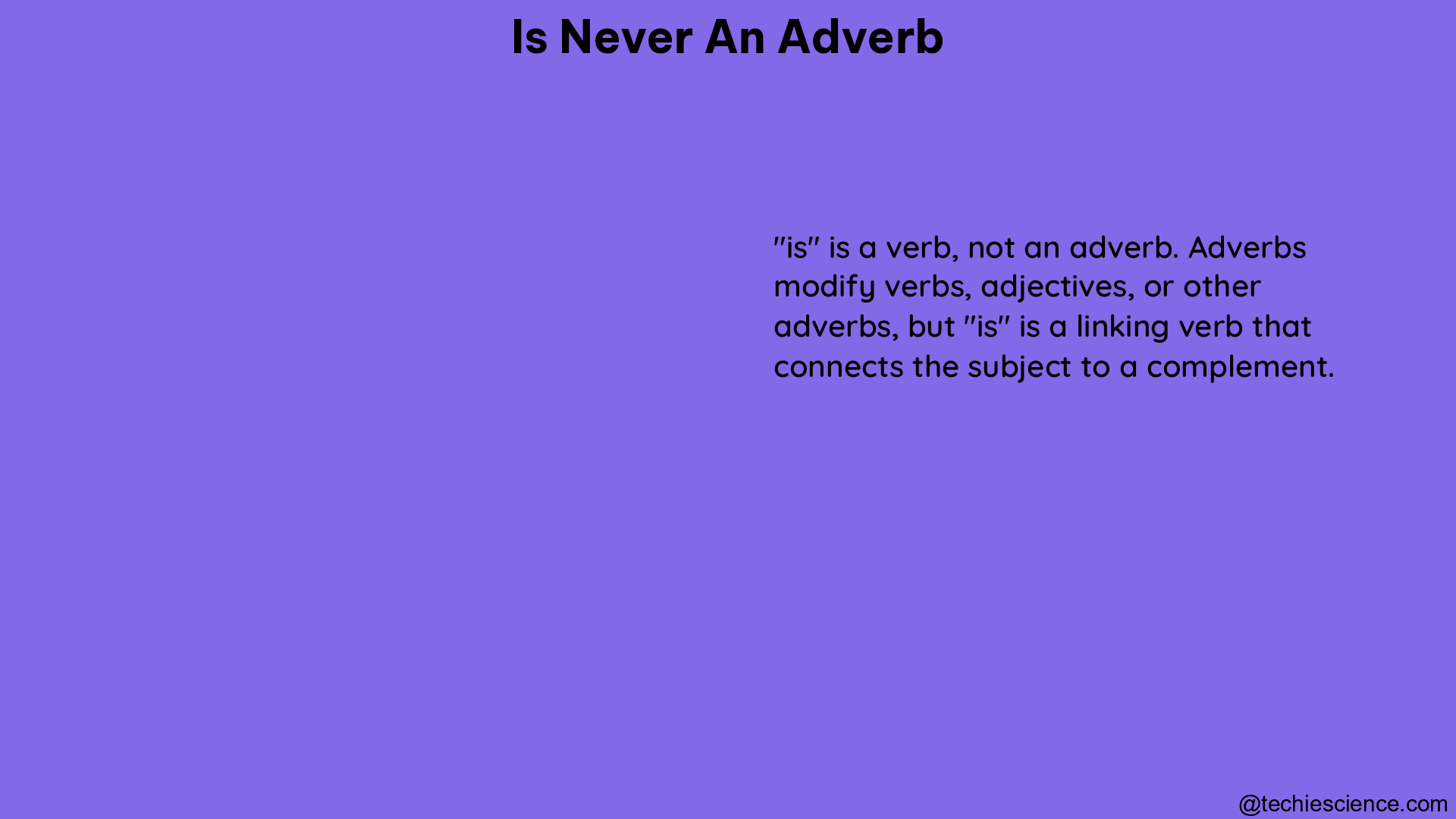Yes, “never” is an adverb. It is used to indicate that something will not happen at any time or to emphasize a negative statement. This comprehensive guide delves into the advanced details and grammatical specifications of the adverb “never.”
Functions of “Never”
1. Adverb of Time
“Never” functions as an adverb of time, indicating that something will not happen at any time. This can be used to describe both future and past actions.
Examples:
– “I will never shop at that store again.” (indicating that the action will not occur at any time in the future)
– “He has never been abroad.” (indicating that the action has not occurred at any time in the past)
2. Emphasizing a Negative Statement
“Never” can be used instead of “not” to emphasize a negative statement, adding more weight and emphasis to the negation.
Examples:
– “I never knew you had a twin sister.” (emphasizing that the speaker did not know until now)
– “That will never do.” (emphasizing that something is not acceptable)
3. Idioms and Expressions
“Never” is used in various idioms and expressions to convey different meanings, often expressing surprise, disapproval, or a sense of the impossible.
Examples:
– “Well, I never!” (expressing surprise or disapproval)
– “Never mind.” (telling someone not to worry about something)
– “Never say never.” (indicating that nothing is impossible)
Position in a Sentence

The adverb “never” typically comes before adverbs, adjectives, and verbs in a sentence, modifying the respective parts of speech.
Examples:
– “I never help you.” (modifying the verb “help”)
– “It was never easy.” (modifying the adjective “easy”)
Pronunciation
The pronunciation of “never” is /ˈnevər/ in both American and British English.
Word Origin
The word “never” originates from Old English “nǣfre,” which is a combination of “ne” (meaning “not”) and “ǣfre” (meaning “ever”).
Advanced Grammatical Specifications
Negation and Emphasis
When using “never” to negate a statement, it is important to note that it is a stronger form of negation compared to “not.” “Never” emphasizes the complete absence or impossibility of an action, while “not” simply denies the occurrence of an action.
Examples:
– “I never go to the gym.” (emphasizes that the action of going to the gym never happens)
– “I do not go to the gym.” (simply denies the occurrence of going to the gym, without the same level of emphasis)
Placement in Sentences
The placement of “never” in a sentence can affect the meaning and emphasis of the statement. Generally, “never” is placed before the verb or the word it modifies, but it can also be used at the beginning or end of a sentence for additional emphasis.
Examples:
– “I never go to the gym.” (modifying the verb “go”)
– “Never have I gone to the gym.” (emphasizing the complete absence of the action)
– “I go to the gym never.” (emphasizing the complete absence of the action)
Negation with Other Adverbs
When used in conjunction with other adverbs, “never” can create more complex negation patterns. The placement of “never” in relation to other adverbs can change the meaning and emphasis of the statement.
Examples:
– “I never usually go to the gym.” (emphasizing that the action of going to the gym never happens, even though it is a usual occurrence)
– “I usually never go to the gym.” (emphasizing that the usual occurrence is not going to the gym)
Exceptions and Variations
While “never” is primarily an adverb, there are some exceptions and variations in its usage:
- Noun Usage: In certain contexts, “never” can be used as a noun, referring to the state of not happening or existing.
-
“The never of it all was too much to bear.”
-
Adjective Usage: In rare cases, “never” can be used as an adjective, modifying a noun.
-
“The never-ending task of cleaning the house.”
-
Compound Formations: “Never” can be combined with other words to form compound adverbs or adjectives.
- “The never-before-seen event was a true spectacle.”
- “The never-ending stream of traffic was frustrating.”
By understanding the advanced grammatical specifications and nuances of the adverb “never,” you can effectively use it in your writing and communication to convey precise and emphatic negation.
References
- https://www.oxfordlearnersdictionaries.com/us/definition/american_english/never_1
- https://www.dictionary.com/browse/never
- https://www.oxfordlearnersdictionaries.com/us/definition/english/never_1

Hi…..I’m a graduate with a Bachelor’s degree in English Literature. I wish to do a Masters in the same field someday and continue my career in Academia.
Let’s connect through LinkedIn: